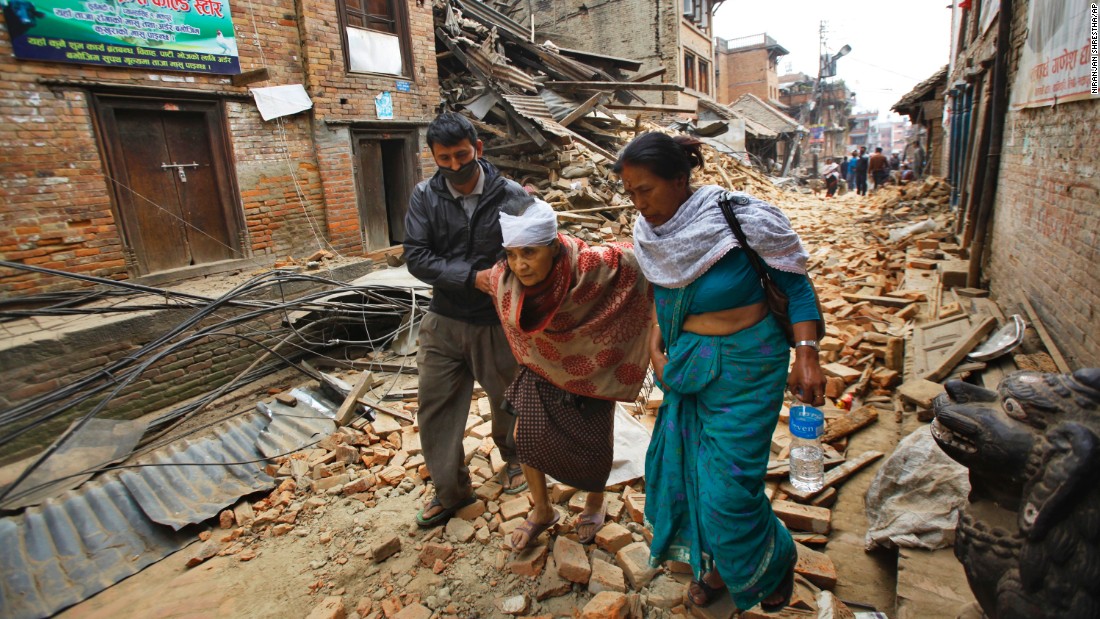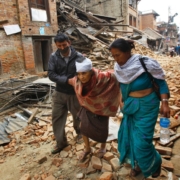Nepal earthquake – a helping hand in a shaken land
 Utter devastation. At least 5,500 dead, thousands more injured and 70,000 homes destroyed. This is the scale of last Saturday’s earthquake in Nepal.
Utter devastation. At least 5,500 dead, thousands more injured and 70,000 homes destroyed. This is the scale of last Saturday’s earthquake in Nepal.
The world reacted immediately – as it now can and does in these types of disasters, thanks to news outlets and social media. Our CMF International Facebook Group has been an excellent way to keep in touch.
On the ground in Nepal, CMF has twelve members. So far we’ve heard from nine who we know are OK.
One member working with BMS as a GP in Kathmandu spent four nights sleeping out on a school basketball court with her three children – and hundreds of others – for fear of aftershocks, but is back home now.
Another member works with UNICEF in Kathmandu. He contacted us to say he and his family are fine but ‘apartment destroyed. Family evacuated to London on Monday. I remain here with UNICEF on a massive response effort.’
Tansen Hospital is 120 km from Pokhara. A CMF member works with UMN as the medical director there. She emailed this to us:
‘The ground shook badly in Pokhara as we are not so far from the epicentre but the damage was not bad and the aftershocks were all nearer Kathmandu. Friends in Kathmandu have had a miserable time as many stayed outside for several days. Newer houses held up quite well. They have water and electricity issues.’
‘Tansen got off lightly and the hospital is one piece. Some villages have many houses down but compared to other districts not too bad. We have had only seven quake related injuries but may be able to be a referral centre for more complicate ortho cases later. We were able to send two doctors from there to Gorkha, which is badly affected with an INF team although I think the need is physical shelter rather than medical care.
Please pray for us to have the wisdom how to be sensible in who we send. All the young doctors are itching to help but we want to only send where they will be really useful and we still have a hospital of sick people here too.’
Dr Sam Dunnet, who was at the CMF National Conference in the UK last weekend, is also now in Nepal. She was going out to visit friends – not expecting there to be an earthquake just before she arrived. She writes:
‘There are a lot of potential problems which could start over the next few days as water runs out and people cannot get food. Riot police are already standing ready and there are long lines of people trying to cram into buses to get out of the city. There is a huge potential for a cholera outbreak (which seems to be a regular occurrence anyway but the risk is much higher with the lack of water and rubbish building up in the streets). The government is not managing to coordinate the response so it is generally chaotic. They need specialists like orthopaedic and neurosurgeons. A lot of aid is disappearing. I am hoping to get to Pokhara, maybe by plane. I think I can be more useful there. Thanks for your prayers.’
Many people in the UK are understandably asking, ‘What can I do?’ Here is a checklist addressing the key questions:
Should I go?
Unless you have specialist skills in medical and nursing care post-disaster or search and rescue training, and unless you have an organisation on the ground that you can work with or that has specifically asked for people with your skills, the probable answer is ‘no’. One of the dangers after this kind of disaster is well intentioned people turning up with no role, no relevant skills, and often without anywhere to sleep or feed themselves. The result is chaos, with energy and time being diverted from saving those in need.
You can read more about why you should think carefully before volunteering in this Guardian development blog
Can I give?
The answer is ‘Yes’! There are several appeals run by UK and Christian organisations working on the ground – here are a few:
- Disasters and Emergency Committee
- INF
- BMS
- UMN
- EMMS International
- World Vision
- Tearfund
- Micah Global
- Samaritan’s Purse
Your money really can help save lives!
How can I know what is happening?
There are many Christian organisations working in Nepal. Most of them have been there for decades, working alongside the local church. They have very recently come together to form a response to the earthquake as the ‘Disaster Relief Christian Community’ (DRCC) and they have formed working groups to respond to the crisis. The focus of DRCC will be on relief prioritising the following: Tents, Mattresses, Food, Medical Support and Advocacy and raising awareness. You can keep up with what they are doing via the Micah Global website.
How can I pray?
Keep informed – follow any or all of the above organisations and the DRCC on social media or sign up for email newsletters. But in the meantime, here are some specifics:
- Pray for speedy and effective rescue efforts to free those trapped in collapsed buildings – time is running out to reach survivors, so the next 24-36 hours are critical!
- Pray that survivors in remote areas can be reached quickly – access is difficult in the mountains due to damage to roads, loss of communications, and difficult terrain for helicopters to land in.
- Pray God’s comfort and healing for the injured, homeless and bereaved.
- Pray for the national churches, aid agency staff and specialist rescue teams working hard in adverse circumstances – for their safety, health and strength.
- Pray for wisdom for all the agencies involved – that there would be good coordination of effort and resources to help those affected most effectively.
Tearfund have produced a Power Point presentation with specific prayer points that can be downloaded from their appeal page which would be ideal to share in a Sunday church service, church prayer meeting or in a home group.
Posted by Andrew Horton, CMF Media Producer
and Steve Fouch, CMF Head of Nursing




Leave a Reply
Want to join the discussion?Feel free to contribute!